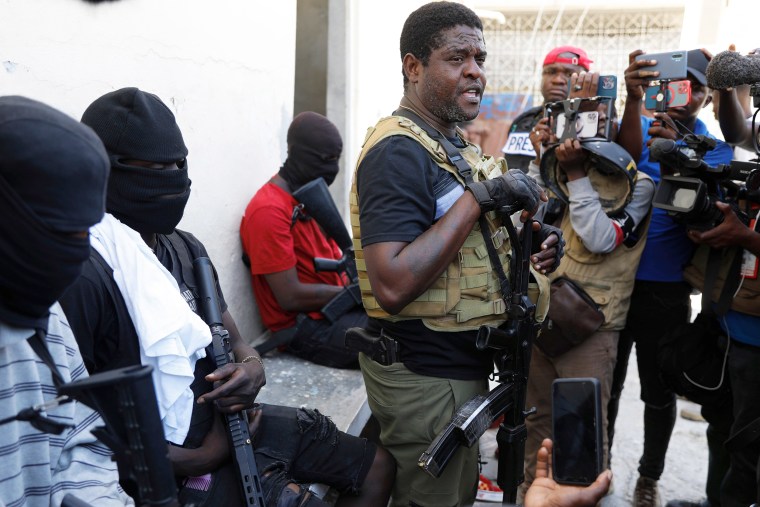The embattled prime minister of Haiti, the Caribbean country whose capital has been overwhelmed by violent gangs, said Tuesday that he would resign.
In a short speech posted to Facebook, Ariel Henry said his government would dissolve once a transitional council had been set up, following a week of "systematic looting and destruction of public buildings and private buildings."
"It hurts us. And it has revolted us," Henry said.
The prime minister appealed for calm: "Haiti needs peace. Haiti needs stability. Haiti needs sustainable development. Haiti needs to rebuild democratic institutions."
The timing of the interim government remains unclear.
The resignation announcement follows weeks of spiraling violence, including prison breaks and an attack on the country's main airport. It came the same day as leaders of Caribbean nations held an emergency meeting in Kingston, Jamaica, to discuss the worsening crisis. Notably, Henry did not attend.
A senior administration official said Monday night that the talks, involving Secretary of State Antony Blinken with 40 representatives from Haiti as well as regional heads of state, had lasted seven hours.
It was agreed that the transitional council will include seven members, with one representing the private sector, the official said.
More Haiti coverage
- Haitian hospital reopens after deadly confrontation with gang
- Director of Haiti orphanage says he's never been more worried amid escalating violence
- U.S. forces fly in to beef up security at embassy in Haiti and evacuate nonessential personnel
- Haitians around the world call for action to stop gang violence
Earlier, Mohamed Irfaan Ali, president of Guyana and chairman of the group known as Caricom, confirmed Henry's resignation at a Monday night news conference.
“We acknowledge the resignation of Prime Minister Ariel Henry, upon the establishment of a transitional presidential council and the naming of an interim prime minister," he said.
Ali said the move to a transitional government "paves the way for a peaceful transition of power.” He said the commitment includes “the road to free and fair elections,” as well as continuity of governance and near-term security.
Henry has been on U.S. soil since last week, forced to land in Puerto Rico after he was unable to land in Haiti due to threats at the airport. Protesters had been seen outside the hotel he’s believed to be staying in as calls for his resignation grew louder.
Last weekend, Haiti was sent into a state of emergency after gangs banded together and attacked government institutions, the airport and prisons, setting free thousands of prisoners.
The notorious “G9 and Family" gang leader, Jimmy Cherizier — known as “Barbecue”— threatened more violence if Henry, prime minister since 2021, did not step down.
Blinken, who flew to Jamaica for Monday's meeting, said earlier Monday that the U.S. and Caricom, a regional trade bloc, "support a clear political transition plan, led by trusted representatives of Haitian society.”
"Haitians cannot wait any longer for a path to security, stability, and democracy," Blinken said on social media Monday.
Philippe Branchat, the United Nations International Organization for Migration head in Haiti, has said that the capital of Port-au-Prince is "under siege" and surrounded by armed groups.
Haiti, one of the poorest countries in the western hemisphere, has long been in crisis.
Gangs have taken over about 80% of the geography of Port-au-Prince, according to the nonprofit Assessment Capacities Project, which provides data to humanitarian groups.

Not helping matters was the 2021 assassination of its president, Jovenel Moïse, killed in an attack on his residence in a Port-au-Prince suburb in July of that year. Moïse had been fighting to try and stay in power when he was killed, and critics had accused him of corruption and overstaying his term under the constitution.
In February, a judge issued a final report that indicts his widow, Martine Moïse, ex-prime minister Claude Joseph and the former chief of Haiti’s National Police, Léon Charles, among others.
Charles was charged with murder, attempted murder, possession and illegal carrying of weapons, conspiracy against the internal security of the state and criminal association.
Martine Moïse and Joseph are accused of complicity and criminal association.
The U.S. State Department warns Americans to stay away from Haiti and has issued a "do not travel" advisory for the country, citing kidnapping, crime and civil unrest.
Six Catholic nuns and others were kidnapped in Haiti in January. In August, American nurse Alix Dorsainvil and her child were kidnapped and held captive for nearly two weeks before they were released.
In 2021, five priests and two nuns were kidnapped from a suburb of Port-au-Prince, and they were held for nearly three weeks before their release was announced.

